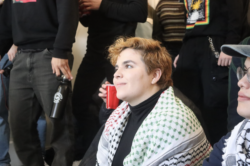Georgetown students participated in a call-in campaign to the office of Secretary of Health and Human Services Tommy Thompson yesterday in Red Square. Callers were encouraged to ask Thompson not to modify an international tobacco treaty proposed by the World Heath Organization and drawn up through the Framework Convention on Tobacco Control.
The treaty includes provisions that would prohibit the use of the words “low tar,” “light,” and “mild” in advertising, as well as prohibiting tax-free sales of cigarettes. The U.S. has proposed that these provisions be removed from the treaty.
“The idea of the treaty is to create a global mechanism to counter tobacco marketing and promotion. Smuggling of tobacco products is also a problem,” said Heather Selin, Tobacco Control Adviser for the Pan American Health Association, the regional office of the World Health Organization for North and South America.
The call-in was part of a national campaign organized by Infact, a non-profit organization that “works to stop corporate abuse,” according to Infact campus coordinator Kate Walsh (CAS ‘04).
“Thompson is chairing the delegation to the FCTC and we wanted him to realize the public is for this treaty and that the US should stop blocking progress on this,” Walsh said.
A table was set up in Red Square around noon, and students were encouraged to call Thompson with Walsh’s cell phone. Phone connections have previously been set up in Red Square by students protesting the potential war in Iraq.
Students could also take a sheet of paper with Secretary Thompson’s number.
“A lot of people took it when they were on their way to class,” said Walsh, who estimated that about 30 people called from Georgetown and 80 more called from other parts of D.C.
Infact’s efforts on campus will include showing Making a Killing to campus groups, a documentary about Philip Morris and its global activities.
The FCTC is the world’s first public health treaty, according to Selin. The convention also marks the first time that the WHO has used its power to initiate negotiations of an international treaty, Selin said. In addition to these efforts, Infact will also be holding a rally and press conference in front of the Department of Health and Human Services on Feb. 12.
Around 150 member states of the WHO are participating in the negotiations, and the final negotiation meeting is scheduled to meet from Feb. 17 to the 28 in Geneva.
“We’ll be putting up signs, sending out emails to campus groups and trying to get anyone we can to come down [to the rally],” Walsh said.




